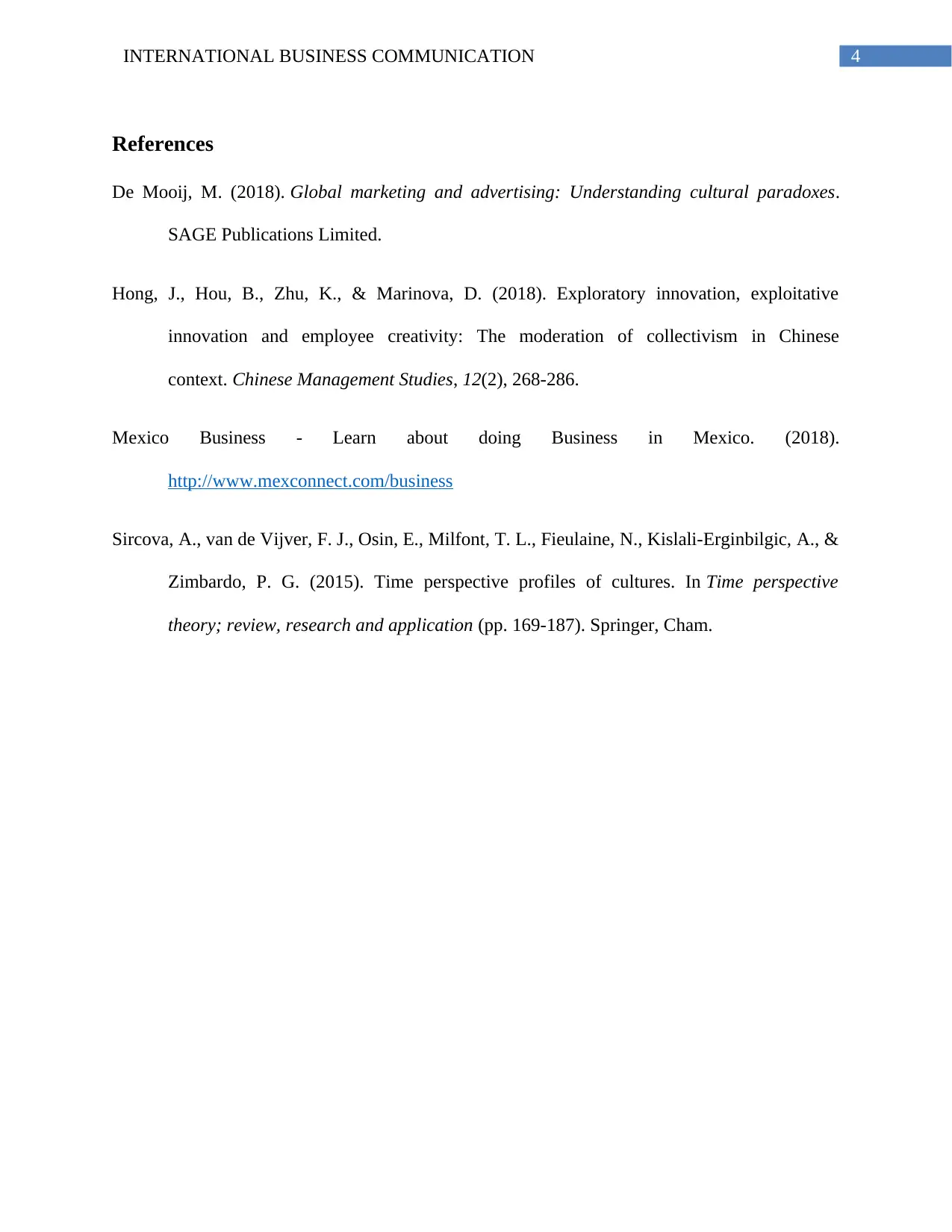Cultural Differences in International Business Communication
VerifiedAdded on 2023/06/03
|5
|850
|326
Essay
AI Summary
This essay explores the impact of cultural factors on international business communication, focusing on collectivism, monochronic, and polychronic cultures. It analyzes the cultural differences between China and Mexico, highlighting how these differences can affect business relationships, particularly in a coffee shop franchise context. The analysis covers aspects such as group orientation, time perception, nonverbal communication, and relationship building. The reflection on classmates' responses emphasizes the importance of understanding cultural nuances for successful international business ventures and raises questions about initiating effective cross-cultural interactions. The work also contrasts individual versus group characteristics in cultural analysis.

Running head: INTERNATIONAL BUSINESS COMMUNICATION
INTERNATIONAL BUSINESS COMMUNICATION
Name of the Student
Name of the University
Author Note
INTERNATIONAL BUSINESS COMMUNICATION
Name of the Student
Name of the University
Author Note
Paraphrase This Document
Need a fresh take? Get an instant paraphrase of this document with our AI Paraphraser

1INTERNATIONAL BUSINESS COMMUNICATION
Business communication is greatly dependent upon the cultural factors that affects the
part of the world where an essential business relationship is being established. Hence
understanding business communications requires sufficient knowledge of the cultural contexts in
which particular negotiations are taking place.
Collectivism refers to the priority that is provided to a group over individuals in
organizational or social situations. China and Mexico have great differences in cultures and this
can largely affect collectivism in the two countries taking into consideration the coffee shop
franchise. In China, a group is always provided greater importance than an individual. Chinese
consider group goals and achievements to be far more important than individual achievements
(Hong et al., 2018). Despite being slightly more individualistic Mexico has a culture that is
greatly influenced by collectivism. Hence, it can be said that Mexicans are both collectivists and
individualistic and like to create a balance between the two (Mexico Business - Learn about
doing Business in Mexico, 2018). Moreover, Mexicans usually like to do business with their own
countrymen and do not necessarily consider building relationships with outsiders. A strong
family feeling works among Mexicans. Relationship building in both the countries are different
than the United States. Whereas the individual is given much more importance in the US, in
China the group is considered to be of foremost importance and in Mexico it is considered to be
as important as an individual.
Organizational cultures around the world can be essentially divided into monochronic
and polychronic work cultures. The divisions are in regards to the general perceptions of time
across various cultures. In monochronic cultures, one work at a time is the general perspective of
doing work. Individual privacy is respected and people do not like to lend or borrow.
Polychronic cultures on the other hand can do many works at a time (Sircova et al., 2015).
Business communication is greatly dependent upon the cultural factors that affects the
part of the world where an essential business relationship is being established. Hence
understanding business communications requires sufficient knowledge of the cultural contexts in
which particular negotiations are taking place.
Collectivism refers to the priority that is provided to a group over individuals in
organizational or social situations. China and Mexico have great differences in cultures and this
can largely affect collectivism in the two countries taking into consideration the coffee shop
franchise. In China, a group is always provided greater importance than an individual. Chinese
consider group goals and achievements to be far more important than individual achievements
(Hong et al., 2018). Despite being slightly more individualistic Mexico has a culture that is
greatly influenced by collectivism. Hence, it can be said that Mexicans are both collectivists and
individualistic and like to create a balance between the two (Mexico Business - Learn about
doing Business in Mexico, 2018). Moreover, Mexicans usually like to do business with their own
countrymen and do not necessarily consider building relationships with outsiders. A strong
family feeling works among Mexicans. Relationship building in both the countries are different
than the United States. Whereas the individual is given much more importance in the US, in
China the group is considered to be of foremost importance and in Mexico it is considered to be
as important as an individual.
Organizational cultures around the world can be essentially divided into monochronic
and polychronic work cultures. The divisions are in regards to the general perceptions of time
across various cultures. In monochronic cultures, one work at a time is the general perspective of
doing work. Individual privacy is respected and people do not like to lend or borrow.
Polychronic cultures on the other hand can do many works at a time (Sircova et al., 2015).

2INTERNATIONAL BUSINESS COMMUNICATION
Unlike monochronic culture interruptions are not viewed negatively and the focus is towards the
creation of good relationships within a team or group (De Mooij, 2018). China has a culture that
is slightly inclined towards monochronic. Mexican culture is polychronic in nature.
Dancing and culture is very much part of the Mexican culture. In China the focus is more
on the traditional art forms and cuisine. The two countries have different nonverbal
communications systems. Mexicans use more hand gestures and in China eye contact and
various body movements are used to communicate. In Mexico, the team may find lesser
difficulty as the culture is significantly similar to other Latin American cultures and coffee is
much preferred. In China tea is preferred and the teams might find more difficulties in business
interaction due to the deep rooted traditions.
Upon viewing my classmates’ responses I would like to say that I did like their
inclinations towards understanding the business cultures prevalent in various countries. From
reading the postings of two of my classmates I learned the significance of cultural
communications in business. I learnt that learning the culture of a place of business is much
important for realizing the stronger business prospects in a country. After reading their works
however, I want to know the exact ways in which positive business communications can be
established. The clarifications that I need are in regards to how better cultural interactions can be
initiated towards establishing effective relationships with the people of a given culture. I noticed
that the two classmates of mine provided a more detailed analysis of the individual
characteristics of the different cultures. On the other hand I have tried to provide group
characteristics. Both of the works however are similar to my work in regards to the analysis of
monochronic and polychronic cultures.
Unlike monochronic culture interruptions are not viewed negatively and the focus is towards the
creation of good relationships within a team or group (De Mooij, 2018). China has a culture that
is slightly inclined towards monochronic. Mexican culture is polychronic in nature.
Dancing and culture is very much part of the Mexican culture. In China the focus is more
on the traditional art forms and cuisine. The two countries have different nonverbal
communications systems. Mexicans use more hand gestures and in China eye contact and
various body movements are used to communicate. In Mexico, the team may find lesser
difficulty as the culture is significantly similar to other Latin American cultures and coffee is
much preferred. In China tea is preferred and the teams might find more difficulties in business
interaction due to the deep rooted traditions.
Upon viewing my classmates’ responses I would like to say that I did like their
inclinations towards understanding the business cultures prevalent in various countries. From
reading the postings of two of my classmates I learned the significance of cultural
communications in business. I learnt that learning the culture of a place of business is much
important for realizing the stronger business prospects in a country. After reading their works
however, I want to know the exact ways in which positive business communications can be
established. The clarifications that I need are in regards to how better cultural interactions can be
initiated towards establishing effective relationships with the people of a given culture. I noticed
that the two classmates of mine provided a more detailed analysis of the individual
characteristics of the different cultures. On the other hand I have tried to provide group
characteristics. Both of the works however are similar to my work in regards to the analysis of
monochronic and polychronic cultures.
⊘ This is a preview!⊘
Do you want full access?
Subscribe today to unlock all pages.

Trusted by 1+ million students worldwide

3INTERNATIONAL BUSINESS COMMUNICATION
Paraphrase This Document
Need a fresh take? Get an instant paraphrase of this document with our AI Paraphraser

4INTERNATIONAL BUSINESS COMMUNICATION
References
De Mooij, M. (2018). Global marketing and advertising: Understanding cultural paradoxes.
SAGE Publications Limited.
Hong, J., Hou, B., Zhu, K., & Marinova, D. (2018). Exploratory innovation, exploitative
innovation and employee creativity: The moderation of collectivism in Chinese
context. Chinese Management Studies, 12(2), 268-286.
Mexico Business - Learn about doing Business in Mexico. (2018).
http://www.mexconnect.com/business
Sircova, A., van de Vijver, F. J., Osin, E., Milfont, T. L., Fieulaine, N., Kislali-Erginbilgic, A., &
Zimbardo, P. G. (2015). Time perspective profiles of cultures. In Time perspective
theory; review, research and application (pp. 169-187). Springer, Cham.
References
De Mooij, M. (2018). Global marketing and advertising: Understanding cultural paradoxes.
SAGE Publications Limited.
Hong, J., Hou, B., Zhu, K., & Marinova, D. (2018). Exploratory innovation, exploitative
innovation and employee creativity: The moderation of collectivism in Chinese
context. Chinese Management Studies, 12(2), 268-286.
Mexico Business - Learn about doing Business in Mexico. (2018).
http://www.mexconnect.com/business
Sircova, A., van de Vijver, F. J., Osin, E., Milfont, T. L., Fieulaine, N., Kislali-Erginbilgic, A., &
Zimbardo, P. G. (2015). Time perspective profiles of cultures. In Time perspective
theory; review, research and application (pp. 169-187). Springer, Cham.
1 out of 5
Related Documents
Your All-in-One AI-Powered Toolkit for Academic Success.
+13062052269
info@desklib.com
Available 24*7 on WhatsApp / Email
![[object Object]](/_next/static/media/star-bottom.7253800d.svg)
Unlock your academic potential
Copyright © 2020–2026 A2Z Services. All Rights Reserved. Developed and managed by ZUCOL.




